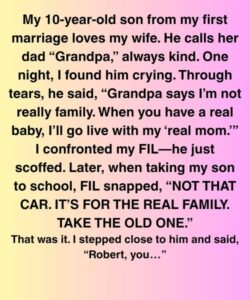It was one of those sweltering afternoons where everything slows down—the kind of day where you expect to see dads mowing lawns or half-heartedly tossing a ball in the yard. But what I saw in our neighbor’s backyard stopped me cold.
I’d been distracted with laundry and dishes, the usual blur. When I glanced out the window, I saw him—Brian, the guy next door—carrying all three of his kids at once like it was nothing.
One on each arm. One on his back. One crawling over his shoulders, giggling. He didn’t flinch.
No yelling. No “get down from there!” Just this quiet focus and some kind of strength I couldn’t quite explain. He looked tired—God, he looked tired—but there was this gentle determination in his face, like he was holding the whole world together, one kid at a time.
Later that day, I bumped into him by the mailbox and joked, “Man, you’re out there doing the work of four people.”
He just smiled, rubbed the back of his neck and said, “Nah, I’m just a dad.”
But I remember thinking—no. You’re not just anything.
And when I found out what had happened a few years ago… why he ended up raising them alone… why he doesn’t talk much about their mom…
That’s when I realized something I can’t forget.
A couple weeks later, my curiosity got the better of me. Brian wasn’t one for small talk beyond pleasantries, but we ran into each other again while walking the kids to the park. His youngest, Ellie, was clutching his hand tightly as her older siblings raced ahead. My son, Mikey, fell into step beside hers, chatting excitedly about dinosaurs. It felt natural enough to ask how they were settling into the neighborhood since moving here last year.
“Oh, you know,” Brian said, shrugging modestly. “Just trying to keep everyone fed and happy. That’s half the battle, right?”
I nodded, though something in his tone made me pause. There was an undercurrent—a weight—that he seemed to carry lightly but never fully set down. I wanted to ask more, but before I could, Ellie tugged on his sleeve.
“Daddy, pick me up!” she demanded, pointing toward the swings.
Without hesitation, Brian hoisted her onto his shoulders, balancing her effortlessly despite carrying a diaper bag slung over his shoulder. Watching him, I couldn’t help but think about how different parenting must feel when you’re flying solo. He didn’t have anyone to tag-team with, no partner waiting at home to take over when exhaustion hit. Yet every move he made radiated patience and love.
On the way back from the park, Mikey announced loudly that he thought Brian was “the strongest dad ever.” The comment earned a laugh from both of us, but it also sparked a memory in Brian’s eyes—a flicker of sadness that vanished almost instantly.
It wasn’t until months later, during a community potluck, that I finally pieced together the rest of the story. Mrs. Patel, who lived across the street, mentioned casually that Brian had moved here after losing his wife. Her voice softened as she explained that it had been sudden—an accident—and that he’d been left to raise their children alone.
“He doesn’t talk about it much,” she added quietly. “But I think keeping busy is how he copes.”
The revelation hit me hard. All those moments I’d observed—the quiet strength, the unshakable focus—they weren’t just traits of a good parent; they were survival mechanisms. Every playful piggyback ride, every bedtime story, every scraped knee kissed better—it was all part of a promise he’d made to himself: to be there for his kids no matter what.
Over time, Brian and I became closer friends. We’d chat over fences, share tips on potty training (his twins were going through it too), and occasionally trade babysitting duties so the other could catch a break. Through these interactions, I began to notice little things about him—the way he always carried snacks in his pockets for unexpected meltdowns, the way he tucked notes into lunchboxes even though his kids were too young to read yet. Each detail revealed a man deeply committed to creating stability for his family, even if life hadn’t given him a fair shake.
Then came the twist I never saw coming.
One Saturday morning, I woke up to find Brian pacing outside his house, looking frantic. His truck was parked haphazardly in the driveway, its doors wide open. When I asked what was wrong, he told me Ellie had gone missing.
“She wandered off while I was loading groceries,” he stammered, panic edging his voice. “I turned my back for two minutes…”
My stomach dropped. Without hesitation, I grabbed my phone to call the police, then rallied the neighbors to start searching. For hours, we scoured the streets, calling her name, checking bushes and sheds. The fear in Brian’s eyes was unbearable—it mirrored the desperation any parent would feel, amplified by the guilt of knowing he’d momentarily let his guard down.
Finally, just as dusk began to fall, someone spotted Ellie near the creek behind the development. She was sitting cross-legged, completely unfazed, tossing pebbles into the water. Relief washed over us like a tidal wave.
When Brian reached her, he collapsed to his knees and pulled her into a tight hug. Tears streamed down his face as he whispered, “You scared me, baby girl. Don’t ever do that again.”
Ellie blinked up at him innocently. “I just wanted to see the fishies, Daddy.”
For a moment, the entire group stood frozen, watching father and daughter reunite. Then, as if sensing the collective relief, Ellie grinned and held out a soggy handful of rocks. “Look what I found!”
Brian laughed shakily, ruffling her hair. “Let’s go home, okay? Mommy used to love fish too.”
The words hung in the air, heavy with meaning. It was the first time I’d heard him mention his late wife aloud. Later, I learned that visiting the creek had been a tradition for their family—a place where they’d spent countless afternoons together before tragedy struck. In that instant, surrounded by neighbors who cared deeply for him, Brian allowed himself to grieve openly for the first time.
In the weeks that followed, something shifted in our community. People started reaching out to Brian more often—not out of pity, but because they genuinely admired the way he handled life’s challenges. Neighbors invited him to barbecues, offered to babysit, or simply stopped by to lend an ear. Slowly but surely, Brian began to let others in, sharing stories about his wife and the dreams they’d once shared for their family.
Through it all, I couldn’t shake the image of that day in the backyard—the man carrying three kids with such grace and purpose. What I mistook for mere physical strength was actually resilience born of love. Brian wasn’t just a dad; he was a hero, quietly battling grief and responsibility with unwavering dedication.
As the seasons changed, so did our friendship. One evening, sitting on my porch with cups of tea, Brian turned to me and said, “You know, I used to think being a single parent meant I was failing somehow. Like I wasn’t giving them enough. But now I realize… it’s not about perfection. It’s about showing up, even when it’s hard.”
His words stayed with me long after he left. They reminded me of something profound: Life rarely goes according to plan, but the way we respond defines us. Whether it’s raising kids alone, rebuilding after loss, or simply trying to make ends meet, true strength lies in perseverance and love.
So here’s the lesson I’ll carry forward: When life knocks you down, don’t be afraid to lean on others. And when you see someone quietly carrying the weight of the world, offer a helping hand—or at least a kind word. Because sometimes, the bravest heroes are the ones living right next door.
If this story resonated with you, please share it with your friends and family. Let’s spread a little kindness and remind ourselves of the power of community. ❤️




